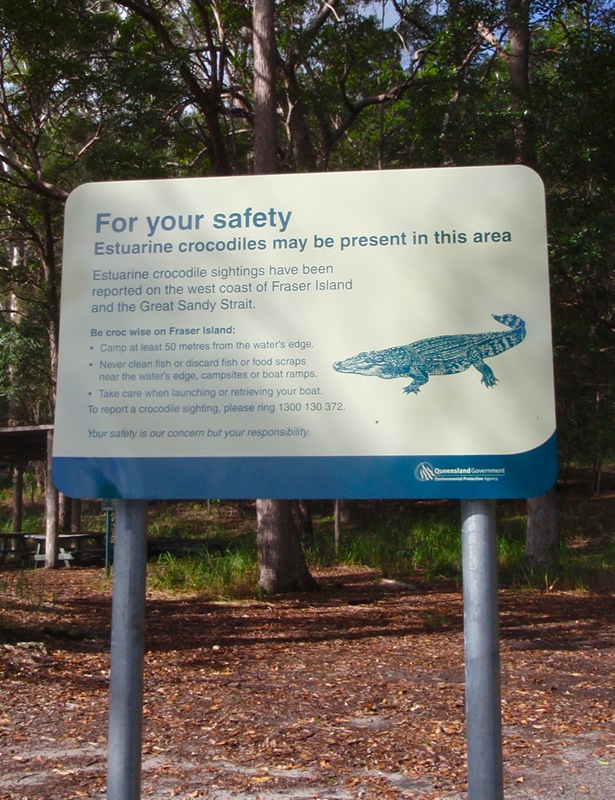Crocodiles, Dingoes & Mosquitoes Oh My! - Garry's Anchorage, Great Sandy Strait, Queensland, Australia

Harmonie
Don and Anne Myers
Fri 30 Apr 2010 11:06
|
25:37.855S 152:58.312E
On April 21st, we weighed anchor and turned north
up the Great Sandy Strait. We had a beautiful three hour sail on flat
water, the tide carrying us gently past mangrove lined shores and masses of
sand flats. Garry's Anchorage is as snug as
an anchorage can be, wedged in the very shallow waters between Fraser Island and
Stewart Island. You can see for yourself if you zoom in on our location on
the Google Map. We stayed for three nights while we waited for Storyteller
to catch up with us.
Fraser Island is the world's largest sand
island. It's literally made of sand. And it's big. All
good aside from the fact that it is infested with an equally large population
of sand flies and mosquitoes. The recent buckets of rain
probably didn't do much to discourage the nasty little buggers
either. We ventured onto the island for a walk, and while we were
diligently reading the warning signs about crocodiles and dingoes, the
mosquitoes moved in. For those of you that have had the pleasure
of hearing Don sing the 'Skeeter Song', we were living the second verse, '...you
can hear'em all a-buzz'in..." A huge swarm - buzzing and dive-bombing
us. Or really, to be honest, buzzing and dive-bombing Don. Maybe
they've heard Don sing the Skeeter Song and haven't been pleased? I'm
not sure, but all insects seem to love Don and leave him covered with
giant itchy welts which he then whinges about for hours
afterward. On this particular day, we went on with our walk after
smothering ourselves with bug spray.
We didn't see any crocodiles. We weren't in a
big hurry to go swimming either though. Each time we beached the
dinghy, we did so gingerly, and got it and ourselves out of the murky water and
onto the beach as quickly as possible. Crocodiles are fast in the water,
but sluggish on land, or so we've read. It's probably extremely rare that
one would be seen as far south as Fraser Island, but who are we to question
the warning signs? (see picture 1) Crocodiles will be become
more of an issue as we get further north. They love to hang
out in the places where sailboats love to anchor - sheltered waters at the
mouth of a river, for example. We won't see them on the various islands we
plan to visit as we island hop north inside the Great Barrier Reef,
but might see them when we run out of islands and have to
anchor off the mainland instead. We're thinking there won't be a lot
of swimming happening on the coast of what's called 'Far North
Queensland' (FNQ for short - say that fast and you'll see why the rest of
Australia gets a kick out of calling remote Far North Queensland FNQ).
We've read that the Australian crocodile is the largest reptile in the world,
sometimes growing as long as 25 feet, although 10-15 foot crocs are much
more common. We are not necessarily looking forward to seeing any of
them.
Fraser Island is also known for its Dingoes.
Dingoes are a little like wild dogs. The difference is that dingoes were
never domesticated. They are indigenous to Australia, and like wolves or
coyotes, live in the wild and probably don't want to be bothered by us.
Fraser Island is home to a few packs of dingoes, and there have
been a couple of instances where a dingo has attacked a human.
Usually the human was doing something stupid, like feeding the dingo, but there
you go - they are dangerous. We didn't see any dingoes, although
we did hear them howling and were glad we were on the boat and they were on
the island.
Australia is just chock full of creepy
creatures. There are giant pythons and a mess of poisonous snakes both in
the water and on land with ominous names like the death adder. All this
talk of snakes makes us yearn for New Zealand where snakes are
nonexistent. No wonder the Kiwis call their country 'Godszone' (God's
own). Poisonous jellyfish also like to hang around in Australian waters -
not so much in the winter (May - November) thankfully for us. One sting
from one of these and death could result. And we thought the skeeters and leeches were bad...
Anne |
